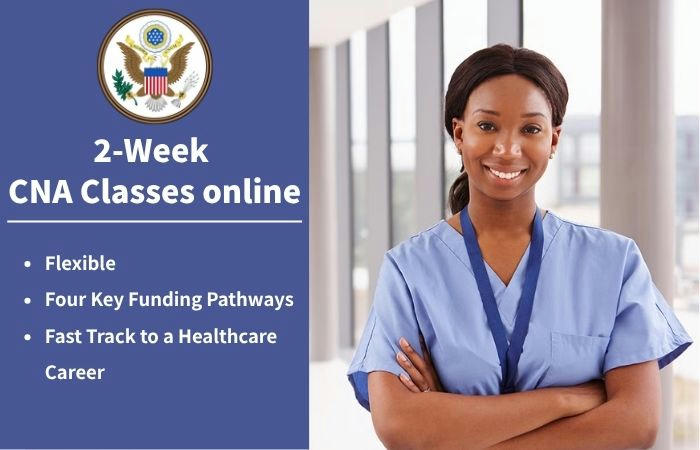10-Day CNA Classes | Flexible | Four Key Funding Pathways | Fast Track to a Healthcare Career
The two-week CNA (Certified Nursing Assistant) accelerated course offers a fast and practical route for individuals eager to begin a healthcare career.Learners aged 16 and above (those under 18 may need guardian consent) can apply.Below you will find essential details about the program structure, entry process, funding options, and how it fits different age groups and goals.

1. Program Overview and Format
Structure Highlights
- Integrated learning: classroom theory + lab skills + clinical practice
- Approximately 100 contact hours (may vary by institution)
- Designed for quick completion within 10 to 14 days
Typical Schedule Example
- Days 1–6: Theory and skills lab sessions
- Days 7–10: Clinical rotations or externship hours
- Some institutions offer extended versions to fit flexible schedules
Learning Format
-
Theoretical modules may be completed online, allowing learners to balance study, work, and personal life
-
Clinical and skills lab components require in-person participation for certification eligibility
2. Suitable Candidates and Age-Based Recommendations
2.1 Who Fits
- Individuals entering the healthcare field for the first time
- Anyone aged 16 years or older (those under 18 may need guardian consent)
- Those seeking a short, focused study plan while maintaining work or family duties
- Learners preparing for CNA certification and entry-level healthcare employment
2.2 Learning Goals and Career Directions by Age Group
| Age Range | Key Motivation | Recommended Learning Mode | Common Career Pathways |
|---|---|---|---|
| 16–35 years old | Career start, higher energy and flexibility | Full-time or intensive on-campus course | CNA → LPN or RN studies, healthcare degree pathways |
| 36–55 years old | Career change or desire for stable healthcare work | Hybrid or evening/weekend schedule | Long-term care centers, hospital support roles |
| 56–70+ years old | Re-entry into the workforce or volunteer service | Moderate-pace programs, skill-based focus | Senior care, community health, part-time caregiving |
3. Admission and Enrollment Guidelines
Basic Eligibility
- Minimum age: 16 years (those under 18 may need guardian consent)
- Government-issued identification
- Health and TB screening; vaccination proof
- Background check (as required by state regulations)
Enrollment Steps
- Locate an approved CNA training provider or school
- Complete the online or in-person enrollment form
- Submit all required documents and request financial assistance if applicable
- Receive confirmation of class placement and schedule
4. Tuition Assistance and Sponsorship Options
Below are four of the most effective channels to explore when seeking tuition support or sponsored CNA training.
-
Workforce Development Centers (One-Stop Career Centers)
- Provide guidance on state-funded training and approved CNA programs
- Offer career counseling and referral to certified institutions
-
Registered Apprenticeships or Employer-Sponsored Training
- Train and work simultaneously; healthcare employers may cover partial
-
Community or Technical College Scholarship Programs
- Some colleges partner with healthcare organizations or state agencies to provide tuition assistance
-
Nonprofit and Foundation-Based Grants
- Local health foundations or nonprofit groups occasionally fund vocational healthcare training
Tip: Begin by visiting a nearby workforce center. Request written confirmation of any tuition support or sponsorship before enrollment.
5. Career Opportunities and Growth Pathways
Common Work Settings
- Hospitals
- Nursing homes and rehabilitation centers
- Long-term care and assisted living facilities
- Home healthcare agencies
Support Services Often Included
- Resume and interview preparation
- Job placement assistance or referral partnerships
Career Advancement Path
- CNA → LPN → RN → Nurse Manager or Healthcare Coordinator
6. Frequently Asked Questions (FAQ)
Can the two-week CNA program be completed entirely online?
Usually not. Most programs are hybrid—online for theory, with in-person clinical and skills lab hours required for certification.
Can 16-year-olds enroll?
Yes, typically with guardian consent and proper documentation.
How can I verify if a funding or sponsorship offer is legitimate?
Contact the funding organization or training provider directly and request a written confirmation of the terms.
